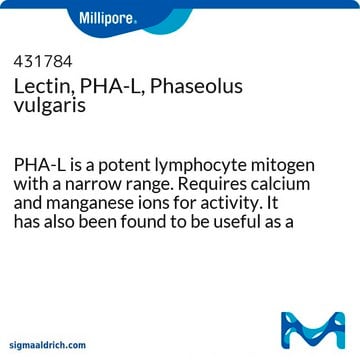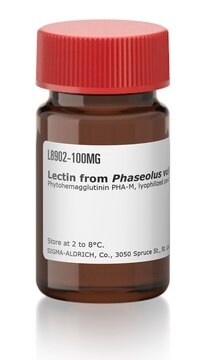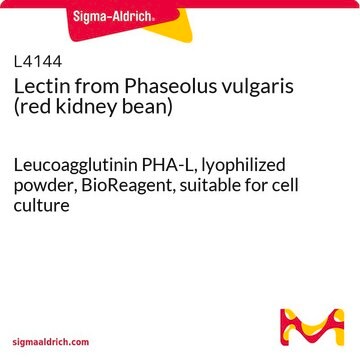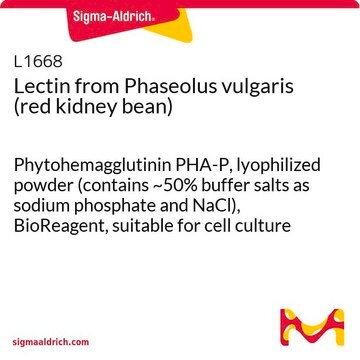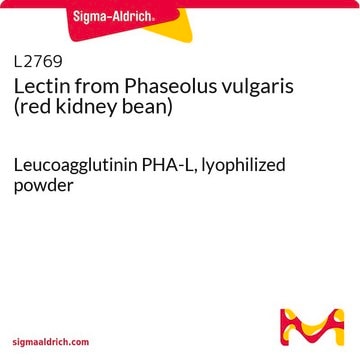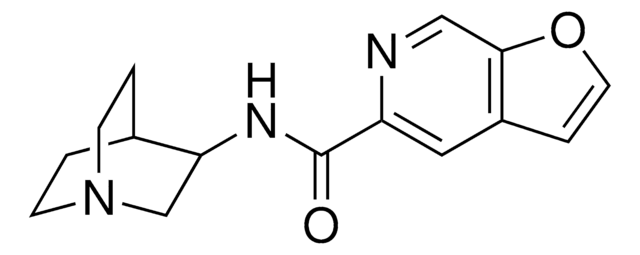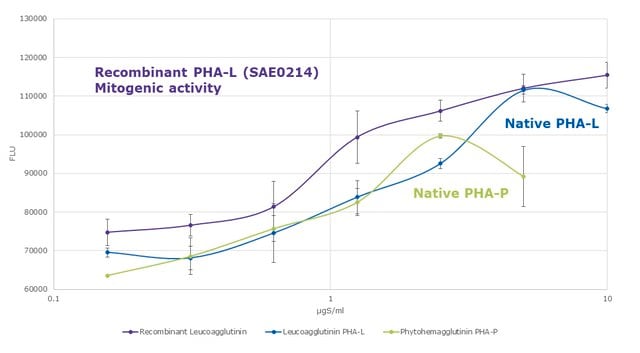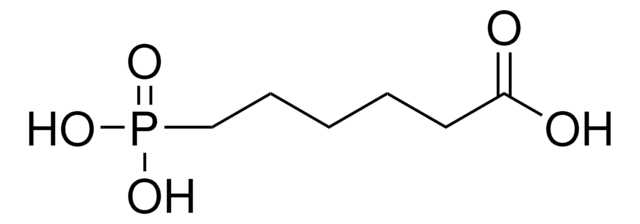11249738001
Roche
Phytohemagglutinin-L (PHA-L)
from Phaseolus vulgaris
Synonym(s):
PHA-L
Sign Into View Organizational & Contract Pricing
All Photos(1)
About This Item
UNSPSC Code:
23201100
Recommended Products
Quality Level
sterility
non-sterile; 0.2 μm filtered
Assay
>95% (SDS-PAGE)
form
lyophilized (clear, colorless solution after reconstitution)
packaging
pkg of 5 mg
manufacturer/tradename
Roche
application(s)
hematology
storage temp.
2-8°C
General description
PHA-L is purified from Phaseolus vulgaris (red kidney bean) by standard chromatographic techniques.
Phytohemagglutinin (PHA), the lectin extract from the red kidney bean, consists of only L-type subunits (isolectin L4, "leuko-agglutinin"). It is an N-acetylgalactosamine/galactose sugar-specific lectin. PHA consists of five isolectins (L4E0, L3E1, L2E2, L1E3, L0E4) each being a tetramer held together by noncovalent forces. The subunits L (leukocyte reactive) have a high affinity for lymphocyte surface receptors, but little for those of erythrocytes, and are responsible for the mitogenic properties of the isolectins. E (erythrocyte reactive) is responsible for the erythrocyte-agglutinating properties.
Phytohemagglutinin (PHA), the lectin extract from the red kidney bean, consists of only L-type subunits (isolectin L4, "leuko-agglutinin"). It is an N-acetylgalactosamine/galactose sugar-specific lectin. PHA consists of five isolectins (L4E0, L3E1, L2E2, L1E3, L0E4) each being a tetramer held together by noncovalent forces. The subunits L (leukocyte reactive) have a high affinity for lymphocyte surface receptors, but little for those of erythrocytes, and are responsible for the mitogenic properties of the isolectins. E (erythrocyte reactive) is responsible for the erythrocyte-agglutinating properties.
Application
Phytohemagglutinin-L (PHA-L) consists of only L-type subunits (isolectin L4, "leuko-agglutinin"), and is well suited for high-efficiency induction and the functional analysis of T-lymphocytes. It is highly purified and tested for high-efficiency stimulation of human lymphocytes. It is also used as positive controls for peripheral blood mononuclear cells (PBMC) stimulation.
Biochem/physiol Actions
Phytohemagglutinin (PHA) has mitogenic and potent cell agglutinating activities. It binds to T-cell membranes and stimulates cell division and metabolic activity. PHA has the ability to stimulate close contacts between cell membranes.
Specifications
Biological activity: <5μg/ml for maximal stimulation of DNA synthesis (BrdU incorporation) with human peripheral blood lymphocytes
Sequence
PHA-L is a tetramer of 4 L-type subunits held together by noncovalent forces.
Preparation Note
Working concentration: 1 to 5 μg/ml
Approximately 1 to 5 μg/ml for the stimulation of human peripheral blood lymphocytes
Storage conditions (working solution): -15 to -25 °C
The reconstituted solution is stable at -15 to -25 °C.
Note: Store the reconstituted solution in aliquots at -15 to -25 °C.
Avoid repeated freezing and thawing.
Approximately 1 to 5 μg/ml for the stimulation of human peripheral blood lymphocytes
Storage conditions (working solution): -15 to -25 °C
The reconstituted solution is stable at -15 to -25 °C.
Note: Store the reconstituted solution in aliquots at -15 to -25 °C.
Avoid repeated freezing and thawing.
Other Notes
For life science research only. Not for use in diagnostic procedures.
Storage Class Code
11 - Combustible Solids
WGK
WGK 2
Flash Point(F)
Not applicable
Flash Point(C)
Not applicable
Certificates of Analysis (COA)
Search for Certificates of Analysis (COA) by entering the products Lot/Batch Number. Lot and Batch Numbers can be found on a product’s label following the words ‘Lot’ or ‘Batch’.
Already Own This Product?
Find documentation for the products that you have recently purchased in the Document Library.
Customers Also Viewed
Mengze Song et al.
International journal of molecular sciences, 24(2) (2023-01-22)
Bone health problems are a serious threat to laying hens; microbiome-based therapies, which are harmless and inexpensive, may be an effective solution for bone health problems. Here, we examined the impacts of supplementation with Clostridium butyricum (CB) on bone and
J L Ceuppens et al.
Journal of immunology (Baltimore, Md. : 1950), 141(11), 3868-3874 (1988-12-01)
T cell proliferation induced by the lectin PHA requires the presence of monocytes. Here, we report that IL-6 represents part of the monocyte-derived helper activity for human T cell stimulation with PHA. Resting T cells isolated from peripheral blood or
Daniel Larcombe-Young et al.
STAR protocols, 3(2), 101414-101414 (2022-05-28)
Dual co-stimulation may be harnessed using parallel chimeric antigen receptors (pCARs) in which two distinct co-stimulatory units are adjacently localized on the plasma membrane. This protocol summarizes construct design, human T cell isolation, retroviral transduction, tissue culture expansion, and preclinical
ELISPOT Assay to Measure Peptide-specific IFN-γ Production.
Wykes M N and Renia L.
Bio-protocol, 7(11) (2017)
Michelle N Wykes et al.
Bio-protocol, 7(11), e2302-e2302 (2017-06-05)
Interferon-gamma (IFN-γ) is crucial for immunity against intracellular pathogens and for tumor control. It is produced predominantly by natural killer (NK) and natural killer T cells (NKT) as well as by antigen-specific Th1 CD4+ and CD8+ effector T cells. When
Our team of scientists has experience in all areas of research including Life Science, Material Science, Chemical Synthesis, Chromatography, Analytical and many others.
Contact Technical Service
